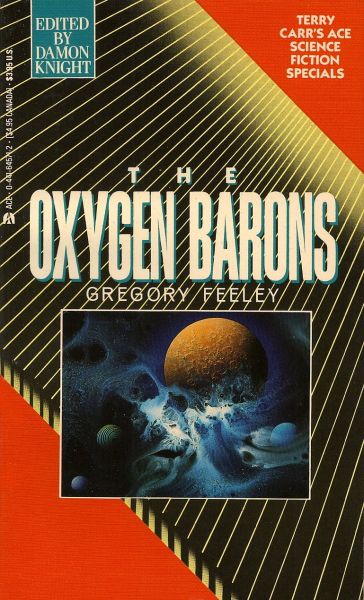Live in Dreams Today
The Oxygen Barons
By Gregory Feeley

7 Feb, 2023
Gregory Feeley’s 1990 The Oxygen Barons is the twelfth and final volume in the Third Ace Science Fiction Specials series. The Oxygen Barons is a hard science fiction novel.
The Lunar Republic arose on a very nearly terraformed Moon, effectively revolting against the investors who paid for the terraforming. Like so many revolutionary republics before it, the Lunar Republic swiftly broke into opposing factions. This was a sufficient pretext for the powers that be to order a total embargo of the Moon.
Political idealism of several flavours cannot wave away the physical reality that faces the revolutionaries.
Terraforming hadn’t quite finished by the time the Republic was declared. Additionally, the Moon has a low escape velocity; hence it will soon revert to a state of nature without constant upkeep. If the embargo and the armed conflict do not end soon, the life-bearing phase of the Moon’s existence is doomed.
There’s also an immediate problem. Volatiles to sustain the newly terraformed Moon must be imported from elsewhere in the Solar System. A swift-moving volatile-rich body is inbound, but it is posing great danger. Galvanix (who renamed himself to embrace the spirit of the Republic) volunteers to take part in a mission to intercept and disperse the object.
The mission is a mixed success: the comet is dealt with but in the process, Galvanix is irradiated. Galvanix and his pragmatic to the point of untrustworthiness off-world ally Taggart end up marooned in hostile territory. Many adventures await!
Embargoed as they are, the Lunars have no idea that the establishment that shuns them is as divided as the Moon. A war over who will control off-Earth resources, potentially humanity’s future, is breaking out. The delicate lunar ecosystem may be just one of the many casualties.
~oOo~
Finally! A novel about lunar revolutionaries wherein the revolutionaries (or at least a large fraction of them) are idealistic idiots. The case for an independent Moon doesn’t seem particularly strong. This isn’t a flaw in the novel, as it’s trivial to find nationalist movements undeterred by any sort of compelling logic1. I could name half a dozen or more just from Canadian history.
Some readers may think that it was a mistake to choose Galvanix as the protagonist and viewpoint character. He doesn’t seem to be able to influence events all that much, despite his mixed success with the comet. But he does give readers a tourist point of view on the Solar System, which is a big deal for someone from a closed world. A guy who could easily have died in chapter one should be happy with what he gets.
I have questions about the precise mechanisms shown for the breakdown in the lunar ecosystems, but the basic point, that the Moon would shed its new atmosphere in a geological eyeblink, seems solid. In fact, the quantity of material needed to maintain a living Moon raises questions about the prudence of the project2.
In the terraformers’ defense, the other space-based effort involves large numbers of space habitats. These may in the long run be just as or even more fragile than the living Moon and just as or more effective at squandering volatiles.
It’s a good thing I am the sort of audience member who spends as much time looking at the flats and backdrops as the actors, because the plot itself is a bit disappointing, consisting mainly of Galvanix travelling from place to place. Readers less interested in worldbuilding (my shtick) might find the plot rather slight. In its defense, I could point at a shelf of Poul Anderson novels with as much world building and just as little plot.
As far as I can tell, The Oxygen Barons is out of print3.
1: Obviously, I don’t mean your nation, whose creation was mandated by unassailable logic and the iron hand of historical necessity.
2: The justification for Moon terraforming was that it would become farmland to supply orbitals. I don’t know that this stands up to close examination, but it’s not as if there hadn’t been previous large-scale projects based on fallacious reasoning.
3: The novel is an outlier, in that it breaks a pattern: in all other cases, if a Third Ace Special is out of print, it’s also the author’s only novel.
Title | Author | In Print? | Author’s Sole Novel |
The Wild Shore | Kim Stanley Robinson | Yes | No |
Green Eyes | Lucius Shepard | Yes | No |
Neuromancer | William Gibson | Yes | No |
Palimpsests | Carter Scholz and Glenn Harcourt | No | Yes |
Them Bones | Howard Waldrop | Yes | No |
In the Drift | Michael Swanwick | Yes | No |
The Hercules Text | Jack McDevitt | Yes | No |
The Net | Loren J. MacGregor | No | Yes |
Metrophage | Richard Kadrey | Yes | No |
The Tides of God | Ted Reynolds | No | Yes |
Black Snow Days | Claudia O’Keefe | No | Yes |
The Oxygen Barons | Gregory Feeley | No | No |
